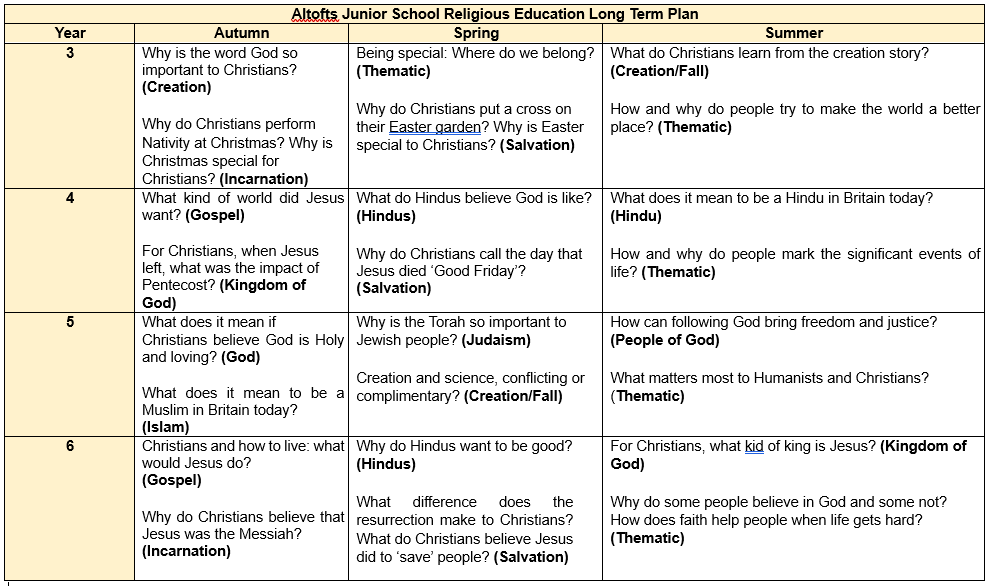Religious Education
Intent
At Altofts Junior School, our vision is to, through following the Wakefield Agreed Syllabus; provide opportunities for children to learn about religion and from religion.
The curriculum aims to ensure that pupils:
- know about and understand a range of religious and worldviews;
- express ideas and insights about the significance and impact of religions and worldviews;
- gain and deploy the skills needed to engage seriously with religious and worldviews.
RE enables pupils to build their sense of identity and belonging which in turn enables them to flourish within their communities and as part of a diverse society. At Altofts Junior School, we acknowledge that we are a predominant White British community and therefore seek to develop sustained and substantial links in the wider religious community. Our teaching of RE therefore also aims to develop respect for others through comparing how different communities live.
Implementation
Altofts Junior School follows the Programme of Study for RE as suggested in the Wakefield Agreed Syllabus for RE through the NATRE Key Stage 2 scheme of work. Pupils are taught knowledge, skills and understanding through learning about Christian, Muslim, Hindu, Jewish and Humanist communities. Each unit of work builds upon children's prior learning.
At Altofts Junior School, a range of teaching and learning styles are utilised, including activities such as discussion, role-play, religious stories, circle-time activities and use of artefacts. Children are informed about a variety of religious festivals that take place throughout the year to demonstrate how people with different religious beliefs live and worship alongside each other. Through whole class teaching, children learn about and from the religions outlined above through three key strands: believing, expressing and living.
Impact
As children progress throughout school, they build on their ability to draw conclusions and form their own opinions based on evidence, dialogue and experience. Children appreciate human similarities and differences and through communication of their views, demonstrating their spiritual, moral and cultural development.
Parents and carers have the rights to withdraw their child from all or part of RE, should you wish. Please contact your child's teacher to discuss further.

Year 3 Knowledge Organisers
What is it like for someone to follow God
What is the trinity and why is it important for Christians
What do Christians learn from the creation story
Year 3 - Knowledge Organiser - Unit 21
Year 3 - Knowledge Organiser - Unit 22
Year 3 - Knowledge Organiser - Unit 24
Year 4 Knowledge Organisers
What does it mean to be a Hindu in Britain today
Why do Christians call the day that Jesus died Good Friday
Year 4 - Knowledge Organiser - Unit 25
Year 4 - Knowledge Organiser - Unit 27
When Jesus left what was the impact of Pentecost
Year 5 Knowledge Organisers
What does it mean to be a Muslim in Britain today
Why is the Torah so important for Jewish people
How can following God bring freedom and justice
Year 5 - Knowledge Organiser - Unit 31
Year 5 - Knowledge Organiser - Unit 34
Year 5 - Knowledge Organiser - Unit 36
Year 6 Knowledge Organisers
Why do Christians believe that Jesus was the Messiah
For Christians what kind of king is Jesus
Year 6 - Knowledge Organiser - Unit 42
Year 6 - Knowledge Organiser - Unit 37








